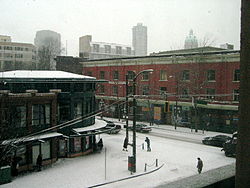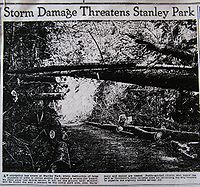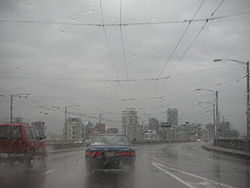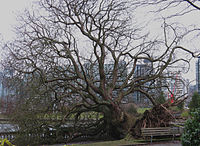- Climate of Vancouver
-
Vancouver, British Columbia, Canada has a moderate oceanic climate (Koppen climate classification Cfb) with summer months that are typically dry, often resulting in moderate drought conditions, usually in July and August. In contrast, the rest of the year is rainy, especially between October and March.
Like the rest of coastal British Columbia, the city is tempered by the warm Japan Current[citation needed] and is also sheltered by the mountains of Vancouver Island, to the west. These influences contribute to making Vancouver the second warmest (after Victoria) of Canada's major cities overall, despite the fact summers are cooler than most other major cities.[1]
Contents
General conditions
Vancouver Climate chart (explanation) J F M A M J J A S O N D 154611238211410384135681785519114022133922135419111131471819317661Average max. and min. temperatures in °C Precipitation totals in mm Source: YVR Imperial conversion J F M A M J J A S O N D 6.143334.846354.550383.356422.762472.267521.671561.571562.166514.456447.148386.94333Average max. and min. temperatures in °F Precipitation totals in inches The climatology of Vancouver applies to the entire Greater Vancouver region and not just to the City of Vancouver itself. While Vancouver's coastal location serves to moderate its temperatures, sea breezes and mountainous terrain make Greater Vancouver a region of microclimates, with local variations in weather sometimes being more exaggerated than those experienced in other coastal areas.
Predicting precipitation in the Greater Vancouver area is particularly complex. It is a general rule of thumb that for every rise of 100 metres in elevation, there is an additional 100 millimetres (1.2 in per 100 ft) of precipitation, so places such as North Vancouver on the North Shore Mountains get more rain. Snow has been particularly problematic for meteorologists to predict due to variations in elevation and the moderating effect of the coast on temperatures.[citation needed]
Temperatures
The annual average temperature in Vancouver is 10.1 °C (50.2 °F), amongst the mildest in Canada. It is located in a USDA plant hardiness zone of 8, similar to Seattle, Portland, Amsterdam and London, as well as places such as Atlanta, Georgia and Raleigh, North Carolina, far to the south. The warm Japan Current usually keeps winter temperatures mild, especially along the lower-lying coastal areas.[citation needed]
Despite normally mild winters, some winters see the arrival of cold arctic outflows from the interior of the continent that can sometimes last a week or more. The coldest month on record at Vancouver International Airport was January 1950, with an average low of −9.7 °C (15 °F) and an average high of −2.9 °C (27 °F), making for a daily average of −6.3 °C (20.7 °F). In 2010, Vancouver became the warmest city to date to host the Winter Olympics.[2]
The Greater Vancouver region is also subject to significant variations in summer temperatures, which can change by as much as 5-10 °C between inland areas of the Fraser Valley and the ocean-tempered coastal regions. Conversely, winter temperatures tend to be cooler inland.
Daylight
Winters in Vancouver can be dark, as the sky during this time is often covered with low-altitude grey clouds, and the relatively high latitude means early sunsets (as early as 4:15 pm) and late sunrises (as late as 8:05 am).
Summers, in contrast, are characterized by a nearly opposite weather pattern, with consistent high pressure and sunshine. July and August are the sunniest months. For several nights near the summer solstice, there are fewer than 7.5 hours between sunset and sunrise, with twilight lasting past 10 pm and the northern sky slightly lit by the sun all night.
Statistics
Climate data for Vancouver Airport, Richmond, BC Month Jan Feb Mar Apr May Jun Jul Aug Sep Oct Nov Dec Year Record high °C (°F) 15.3
(59.5)18.4
(65.1)19.4
(66.9)25.0
(77.0)30.4
(86.7)30.6
(87.1)34.4
(93.9)33.3
(91.9)29.3
(84.7)23.7
(74.7)18.4
(65.1)14.9
(58.8)34.4
(93.9)Average high °C (°F) 6.1
(43.0)8.0
(46.4)10.1
(50.2)13.1
(55.6)16.5
(61.7)19.2
(66.6)21.7
(71.1)21.9
(71.4)18.7
(65.7)13.5
(56.3)9.0
(48.2)6.2
(43.2)13.7 Average low °C (°F) 0.5
(32.9)1.5
(34.7)3.1
(37.6)5.3
(41.5)8.4
(47.1)11.2
(52.2)13.2
(55.8)13.4
(56.1)10.5
(50.9)6.6
(43.9)3.1
(37.6)0.8
(33.4)6.5 Record low °C (°F) −17.8
(0)−16.1
(3.0)−9.4
(15.1)−3.3
(26.1)0.6
(33.1)3.9
(39.0)6.7
(44.1)6.1
(43.0)0.0
(32.0)−5.9
(21.4)−14.3
(6.3)−17.8
(0)−17.8
(0)Precipitation mm (inches) 153.6
(6.047)123.1
(4.846)114.3
(4.5)84.0
(3.307)67.9
(2.673)54.8
(2.157)39.6
(1.559)39.1
(1.539)53.5
(2.106)112.6
(4.433)181.0
(7.126)175.7
(6.917)1,199.0
(47.205)Rainfall mm (inches) 139.1
(5.476)113.8
(4.48)111.8
(4.402)83.5
(3.287)67.9
(2.673)54.8
(2.157)39.6
(1.559)39.1
(1.539)53.5
(2.106)112.5
(4.429)178.5
(7.028)160.6
(6.323)1,154.7
(45.461)Snowfall cm (inches) 16.6
(6.54)9.6
(3.78)2.6
(1.02)0.4
(0.16)0
(0)0
(0)0
(0)0
(0)0
(0)0
(0)2.5
(0.98)16.3
(6.42)48.0
(18.9)Avg. precipitation days (≥ 0.2 mm) 18.5 16.3 17.0 13.9 13.0 11.2 6.9 6.8 8.6 14.2 19.7 19.8 165.9 Avg. rainy days (≥ 0.2 mm) 16.9 15.4 16.7 13.9 13.0 11.2 6.9 6.8 8.6 14.2 19.5 18.2 161.3 Avg. snowy days (≥ 0.2 cm) 3.7 1.9 0.9 0.2 0 0 0 0 0 0 0.8 3.3 10.8 Sunshine hours 60.4 84.6 134.1 182.4 230.7 229.1 294.5 267.9 199.1 124.8 64.3 56.1 1,928.0 Source: Environment Canada[3] Climate data for Canada Place, Vancouver Month Jan Feb Mar Apr May Jun Jul Aug Sep Oct Nov Dec Year Record high °C (°F) 15.6
(60.1)16.4
(61.5)19.1
(66.4)23.9
(75.0)32.7
(90.9)30
(86)31.7
(89.1)31.7
(89.1)28.5
(83.3)24.2
(75.6)17
(63)15
(59)32.7
(90.9)Average high °C (°F) 6.8
(44.2)8.4
(47.1)10.6
(51.1)13.5
(56.3)16.8
(62.2)19.6
(67.3)22
(72)22.3
(72.1)19
(66)13.9
(57.0)9.3
(48.7)6.8
(44.2)14.1 Daily mean °C (°F) 4.8
(40.6)5.9
(42.6)7.6
(45.7)10
(50)13.2
(55.8)15.9
(60.6)18.1
(64.6)18.3
(64.9)15.4
(59.7)11.1
(52.0)7.1
(44.8)4.8
(40.6)11 Average low °C (°F) 2.7
(36.9)3.4
(38.1)4.6
(40.3)6.5
(43.7)9.5
(49.1)12.2
(54.0)14.1
(57.4)14.4
(57.9)11.6
(52.9)8.2
(46.8)4.8
(40.6)2.8
(37.0)7.9 Record low °C (°F) −13.3
(8.1)−6.7
(19.9)−5
(23)−1.1
(30.0)1.1
(34.0)2.8
(37.0)2.8
(37.0)5
(41)1.7
(35.1)−3.2
(26.2)−9.9
(14.2)−15.6
(3.9)−15.6
(3.9)Precipitation mm (inches) 178.8
(7.039)183.8
(7.236)155.8
(6.134)117.9
(4.642)86.7
(3.413)69.9
(2.752)53.4
(2.102)50.8
(2)73.3
(2.886)147.8
(5.819)239.2
(9.417)231.3
(9.106)1,588.6
(62.543)Source: Environment Canada[4] Climate data for Newton, Surrey, BC Month Jan Feb Mar Apr May Jun Jul Aug Sep Oct Nov Dec Year Record high °C (°F) 15.5
(59.9)19.4
(66.9)25
(77)29
(84)34.5
(94.1)33.3
(91.9)35
(95)34.5
(94.1)34.5
(94.1)29
(84)21
(70)16.7
(62.1)35
(95)Average high °C (°F) 6
(43)8.4
(47.1)11.1
(52.0)14.3
(57.7)17.6
(63.7)20
(68)23
(73)23.2
(73.8)20.5
(68.9)14.5
(58.1)8.7
(47.7)6.1
(43.0)14.5 Average low °C (°F) 0.2
(32.4)1.3
(34.3)2.8
(37.0)4.9
(40.8)7.6
(45.7)10.3
(50.5)12.1
(53.8)12.2
(54.0)9.6
(49.3)6
(43)2.7
(36.9)0.5
(32.9)5.9 Record low °C (°F) −17.2
(1.0)−13.5
(7.7)−8.3
(17.1)−2.8
(27.0)−1.1
(30.0)2.2
(36.0)2.8
(37.0)−1.1
(30.0)−2.2
(28.0)−6.5
(20.3)−15
(5)−18.9
(−2.0)−18.9
(−2.0)Precipitation mm (inches) 185.7
(7.311)136.1
(5.358)128.7
(5.067)100.5
(3.957)81.6
(3.213)68
(2.68)50
(1.97)48.7
(1.917)64.2
(2.528)131.4
(5.173)212.3
(8.358)202.1
(7.957)1,409.2
(55.48)Source: Environment Canada[5] Precipitation
Rain
Vancouver generally has 166 days per year with measurable precipitation on average, and 289 days with measurable sunshine. Nonetheless, from November until March, it is not uncommon for there to be 20 consecutive days with some amount of rain. The weather pattern known as the Pineapple Express often brings warm rainstorms in the winter.
Thunderstorms are rare, with an average of 6.1 thunderstorm days per year.[6] The weather in spring and autumn is usually showery and cool.
Grass-cutting season often begins in February and continues through October. Summers can be quite dry, and, as such, unwatered grass may not need to be cut for a month or even longer. Some summers may have no rain for five weeks or more, while others might have several very wet days in a row.
Snow
 A snowy day in Gastown in January 2004.
A snowy day in Gastown in January 2004.
Some snow falls in the higher-lying areas of Greater Vancouver, such as Burnaby Mountain, Coquitlam, and North and West Vancouver, every winter. It is less common in places close to or at sea level and, on occasion, there has been little trace of snow. There is a general misconception among visitors and residents of other parts of Canada that Vancouver does not receive any snow at all, but in fact there has never been a winter in which traceable snow has not been observed at Vancouver International Airport. Environment Canada has ranked Vancouver in 3rd place under the category of "Lowest Snowfall" among 100 major Canadian cities. Interestingly, Vancouver's coastal climate has also allowed it to be ranked in 59th place under the category of "Most huge snowfall days (25 cm or more)", placing it well above cities like Calgary and Toronto.[6]
Snow in Vancouver tends to be quite wet, which, combined with typical winter temperatures rising above and falling below 0 °C (32 °F) throughout the course of the day, can make for unusually slippery road conditions. Rain and sleet are almost interchangeable especially among higher elevations of the city.
Years or months with snowfall surpassing 100 cm (39.3 in) are not completely exceptional. Snowfall exceeding 100 cm occurred twice during the 1990s, and, in January 1972 alone, there was more than 120 cm (47.2 in) of snow. The snowiest year on record at Vancouver International Airport was 1971, which received a total of 242.6 cm (95.5 in), and the greatest snow depth reported was 61 cm (24 in) on January 15 of that year.
Although the 30 cm to 60 cm (11.8 to 23.6 in) which fell across Greater Vancouver and the Lower Mainland in a 24 hour period in November 2006 was out of the ordinary, snow has in fact accumulated at sea level in all months except for June, July, and August. However, even small amounts of snow in the Vancouver area can cause school closures, as well as produce massive traffic problems. Snowfall levels considered routine or mild in other parts of Canada can be relatively catastrophic in Vancouver. Furthermore, the low frequency of snowfall makes it hard to justify the public works infrastructure necessary for more effective snow removal, as the city is usually in a thaw situation long before plowing of streets are completed. The City budgets $400,000 per year for the maintenance of snow removal equipment, for the purchasing of deicing salt, and for the training of staff, but the costs of actual snow removal are funded separately from contingency reserve funds, and vary widely from season to season. For example, $1.1 million was spent in 1998, compared to $0 in 2001.[7] Blizzards are rare but can incapacitate much of the Lower Mainland. One in 1996 resulted in over 60 cm (23.6 in) of snow in Vancouver and was responsible for millions of dollars in damage.
According to Environment Canada, Vancouver typically has a 11% chance of a White Christmas. The most recent White Christmas occurred in 2008 after weeks of record breaking cold temperatures and four consecutive snow storms left over 60 cm of snow on the ground across Metro Vancouver. New snow also accumulated on Christmas Eve and Christmas Day giving it the title for Canada's whitest Christmas in 2008 with 41 cm on ground (48 cm at one point on Christmas Eve). Snow was also measured in the preceding year of 2007 where 1 cm was observed in the Vancouver International Airport. The previous official White Christmas occurred in 1998 when 20 cm of snow was on the ground on Christmas Day following 31 cm of snow and 20 mm of rain.
Severe weather
 Photograph of damage caused by the 1934 storm published in the February 8, 1935 edition of Vancouver Daily Province.
Photograph of damage caused by the 1934 storm published in the February 8, 1935 edition of Vancouver Daily Province.
Gales are unlikely during the autumn months in Greater Vancouver. Three wind storms in the city's history have knocked down large swathes of trees in the forest of Stanley Park, the first having occurred in October 1934, with a blizzard the following January compounding its impact.[8] The second wind storm to hit Stanley Park was the remnant of Typhoon Freda in 1962 that levelled a 6-acre (24,000 m2) tract of forest. This is now site of the park's miniature railroad.[9]
Fall-winter 2006 storms
Main article: 2006 storms in Vancouver, CanadaIn November 2006, the Greater Vancouver region experienced above-average levels of rainfall and snowfall, breaking the previously established record of 18.1 cm (7.15 in) when 25.5 cm (10.07 in) of rain fell within the first 16 days of the month.[10] The heavy rain washed sediment into the city's reservoirs, and, as result, many businesses were advised to stop serving beverages prepared from tap water due to water contamination.
28 cm (11 in) of snow was recorded at Vancouver International Airport from the night of November 25 to the morning of November 27. The temperature dropped to −12 °C (10.4 °F) on November 28, 1.8 degrees[vague] higher than the record low for the day, which was set in November 1985. 10 cm (3.9 in) more snow fell on the city on November 29. The snowfall resulted in the closure of a number of public institutions and caused power outages throughout Surrey and Langley.
The Hanukkah Eve Wind Storm of 2006 swept through Greater Vancouver on December 15, 2006 with winds reaching up to 70 km/h to 125 km/h. In Stanley Park, it damaged or uprooted over 5,000 trees, caused mudslides, one of which destroyed a section of the seawall.[11][12] Insured damages throughout the province are expected to reach CA$40 million and repairs to Stanley Park are expected to cost $9 million.[13][14]
 The view from the Burrard Bridge of the mouth of False Creek on a dry summer's day.
The view from the Burrard Bridge of the mouth of False Creek on a dry summer's day.
References
- ^ Environment Canada Warmest year-round. Retrieved: 2007-08-03.
- ^ "No snow? No surprise. Vancouver is warmest city to ever host Winter Olympics". Vancouver Sun. February 9, 2010. http://communities.canada.com/vancouversun/blogs/parenting/archive/2010/02/09/vancouver-warmest-olympics-snow.aspx.
- ^ "Canadian Climate Normals 1971–2000 at YVR". Environment Canada. May 2011. http://climate.weatheroffice.gc.ca/climate_normals/results_e.html?stnID=889&lang=e&dCode=1&StationName=VANCOUVER&SearchType=Contains&province=ALL&provBut=&month1=0&month2=12. Retrieved 2011-06-09.
- ^ "Canadian Climate Normals 1971-2000 - Vancouver Harbour CS". http://climate.weatheroffice.gc.ca/climate_normals/results_e.html?Province=ALL&StationName=vancouver&SearchType=BeginsWith&LocateBy=Province&Proximity=25&ProximityFrom=City&StationNumber=&IDType=MSC&CityName=&ParkName=&LatitudeDegrees=&LatitudeMinutes=&LongitudeDegrees=&LongitudeMinutes=&NormalsClass=A&SelNormals=&StnId=888&.
- ^ Environment Canada—Canadian Climate Normals 1971–2000, accessed 2009-07-12
- ^ a b Weather Winners WebSites
- ^ Engineering Services, Streets
- ^ "The Damage in the Park". Vancouver Daily Province. February 9, 1935.
- ^ Hazlitt, Tom (May 22, 1964). "It's for real -- this railroad". Vancouver Daily Province.
- ^ Our Wettest Month Ever http://www.canada.com/vancouversun/news/story.html?id=25b2959c-2679-4b25-95b3-5aa376fa3c1a
- ^ Rook, Katie (2006-12-19). "Stanley Park ‘looks like a war zone’". National Post. http://www.canada.com/nationalpost/news/story.html?id=2277e4c8-e3c6-4f78-9841-24e3ce7538b3&k=24902&p=1. Retrieved 2006-12-20.
- ^ Kieltyka, Matt (2006-12-18). "’Look around, it’s just devastation’". 24 Hours. http://vancouver.24hrs.ca/News/2006/12/18/2858488-sun.html. Retrieved 2006-12-20.
- ^ "Insurance claims could hit $80m" by The Province
- ^ "Stanley Park restoration cost rises to $9 million" by CanWest News Service
Categories:- Geography of Vancouver
- Climate by city
Wikimedia Foundation. 2010.


